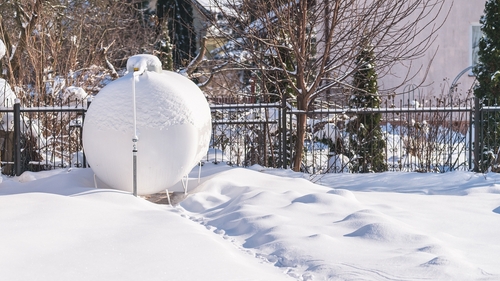 Propane is a clean-burning and safe way to heat your home and water, and run many appliances. Depending on how much propane you need to fuel your home, the tank may even look a lot like a larger version of the propane cylinder you use with your barbecue grill. But while it might seem like install your own propane tank is not very complicated, and a great way to save money, there are significant risks and potential legal complications to doing the job yourself. Here’s why installing your own propane tank is not a good idea.
Propane is a clean-burning and safe way to heat your home and water, and run many appliances. Depending on how much propane you need to fuel your home, the tank may even look a lot like a larger version of the propane cylinder you use with your barbecue grill. But while it might seem like install your own propane tank is not very complicated, and a great way to save money, there are significant risks and potential legal complications to doing the job yourself. Here’s why installing your own propane tank is not a good idea.
Propane is highly flammable, and improper handling or installation can lead to catastrophic accidents. A propane tank that isn’t installed correctly may leak, posing a severe fire or explosion risk.
Additionally, the propane in your tank is highly pressurized, and your system uses a regulator to decrease the pressure as it enters your home. The pressure settings are different for natural gas than for propane and when the regulator is set incorrectly, it can lead to a gas leak. That’s true whether pressure is too high or too low. The problems that result when pressure is too low are why we are required to do a pressure test after you have a runout.
Professionals—like the team at Rand-Wade—are trained to handle propane safely, ensuring the tank is securely placed, connected, and tested for leaks. They also adhere to strict procedures to prevent static electricity or sparks during installation. Without the necessary knowledge and equipment, a DIY installation exposes you, your family, and your property to unnecessary risks.
Because of the safety issues, various local, state, and federal organizations, including the National Fire Protection Association, have established standards and regulations around tank placement. Rules apply to clearance from structures, and the depth of underground installations, among others. Additionally, obtaining the necessary permits often requires an inspection by qualified professionals. Navigating this complex legal landscape on your own can be both frustrating and time-consuming.
Skirting the rules can result in fines or penalties and probably will void your insurance policy.
Installing a propane tank isn’t as simple as hooking up a 5 or 10 gallon tank to the grill on your patio. You need specialized tools and materials, such as pressure gauges, pipe sealants, and regulators. And you need to know how to use them for this specific job.
Our team has a truck with all the tools and equipment necessary, plus we’ve got the training and experience to install your propane tank correctly and efficiently.
Even without any fines for an unlicensed propane tank installation, doing the work yourself could cost you in the long term. Most homeowners’ insurance policies do not cover damage caused by propane systems not done by a professional. If an accident occurs because of a DIY installation, you could be held liable for any injuries or property damage. On the other hand, hiring a licensed professional ensures the work is done to code, reducing liability risks. Most reputable installers will provide a warranty on their work, as well.
Finally, while installing your own propane tank might seem like a way to save money, it will likely leads to higher costs in the long run. Improper installation can cause inefficiencies, leading to wasted propane and higher energy bills. And fixing your mistakes could cost as much—or more—than just hiring a pro in the first place.
When it comes to propane, it’s best to leave the installation to the experts. The pros ar Rand-Wade can help you determine the best size tank for your needs, identify the best location for your tank and make sure it’s installed safely. Remember, we’ve been installing propane tanks for all kinds of homes and businesses in Greene County for more than 45 years. Whether you’re new to propane or just need to replace your tank, contact us for more information today.